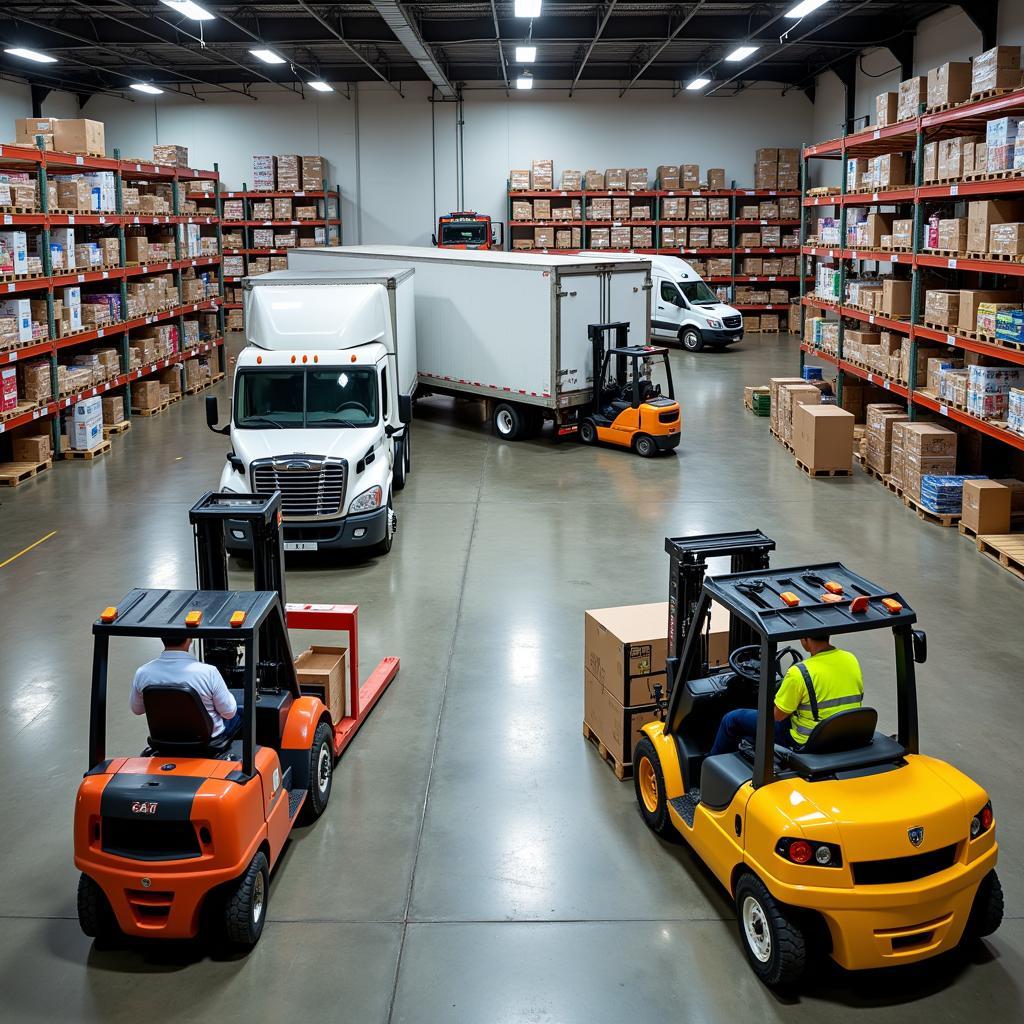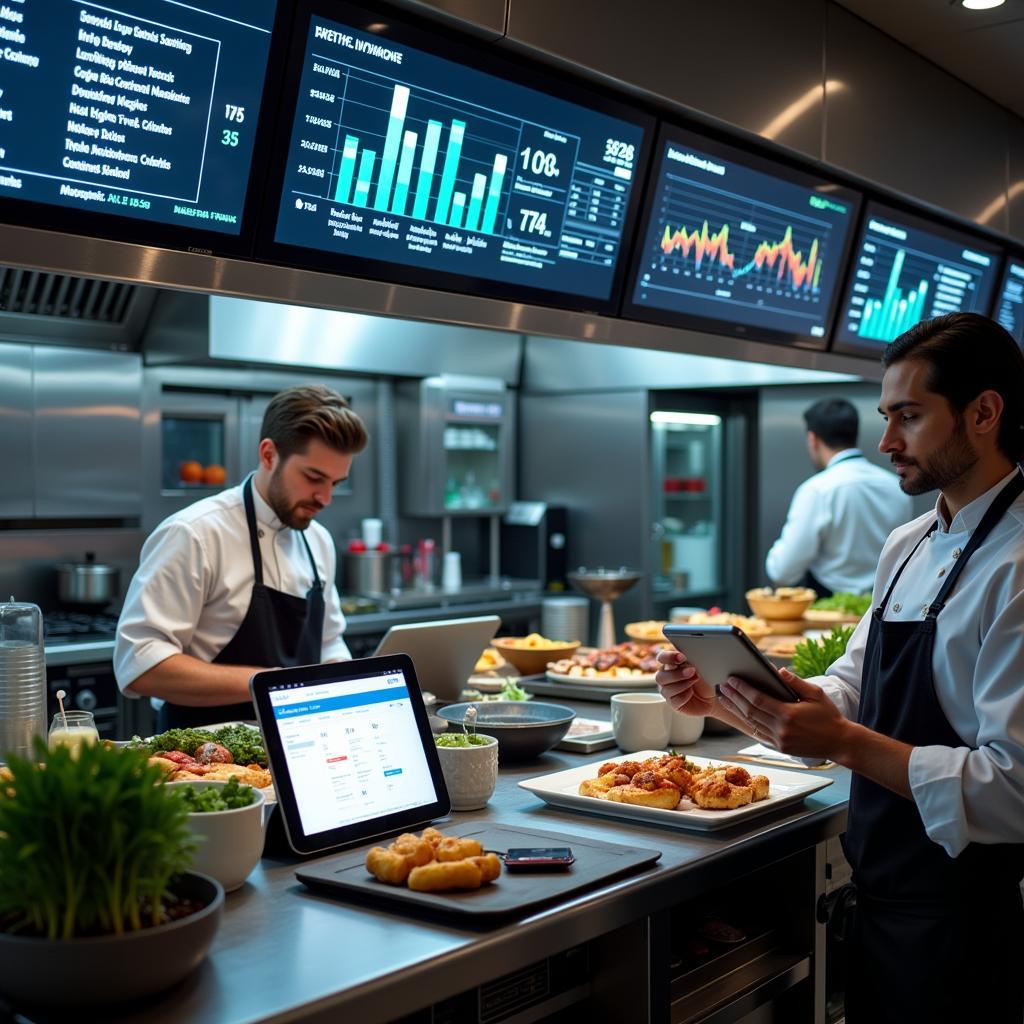Large Food Service Companies play a pivotal role in our daily lives, from providing meals in schools and hospitals to catering corporate events and fueling our favorite restaurants. Understanding how these giants operate and the trends shaping their future can be invaluable for anyone working within the food industry or simply interested in where their food comes from. This article delves into the complexities of these large-scale operations, exploring their challenges, innovations, and impact on the broader food system. We’ll examine key aspects of these companies, from sourcing and distribution to sustainability and technological advancements.
The Inner Workings of Large Food Service Companies
These companies are complex organisms, managing vast supply chains and catering to diverse customer needs. Their operations extend far beyond simply preparing and serving food. They involve intricate logistics, rigorous quality control, and a constant drive for efficiency. One crucial element is their sourcing strategy. Many large food service companies are now prioritizing partnerships with local producers to reduce transportation costs and support regional economies. Check out our selection of small paper bags for food, perfect for local deliveries. This shift towards localized sourcing can also contribute to fresher ingredients and a reduced environmental footprint. Another critical aspect is distribution. These companies often operate massive distribution centers, strategically located to ensure timely delivery of goods to their clients. These centers are marvels of modern logistics, utilizing advanced inventory management systems and temperature-controlled environments to maintain product quality.
 Large Food Service Company Distribution Center
Large Food Service Company Distribution Center
Key Challenges Faced by Large Food Service Companies
Operating on such a large scale presents a unique set of challenges. Fluctuating food prices, evolving consumer preferences, and increasing pressure to operate sustainably are just a few of the hurdles these companies face. Meeting the growing demand for sustainable practices is particularly challenging. Consumers are increasingly aware of the environmental impact of their food choices, and they expect large food service companies to take responsibility. This includes reducing food waste, sourcing ethically, and minimizing their carbon footprint. Another major challenge is managing the complex web of regulations and safety standards that govern the food industry. Ensuring compliance across all levels of the operation requires significant investment in training and oversight. For example, consider the complexities of offering specific dietary options, such as vegan Russian food, which requires specialized knowledge of ingredients and preparation techniques.
Innovations and Trends Shaping the Future of Food Service
Despite these challenges, large food service companies are also at the forefront of innovation. They are constantly exploring new technologies and strategies to improve efficiency, enhance the customer experience, and meet the evolving demands of the market. One significant trend is the increasing adoption of technology. From automated ordering systems to data-driven menu planning, technology is transforming every aspect of the food service industry. Another notable trend is the growing emphasis on personalized nutrition. Companies are experimenting with customized meal plans and offering more diverse options to cater to individual dietary needs and preferences. Looking for vibrant food coloring options? Our tiffany blue food dye is a great choice for adding a pop of color to your creations. This shift towards personalization reflects a broader societal trend towards wellness and individualized health management.
 Food Service Technology Innovation
Food Service Technology Innovation
What Questions to Ask Large Food Service Companies?
When considering partnering with a large food service company, it’s essential to ask the right questions. Here are a few key areas to explore:
- Sourcing: Where do they source their ingredients from? Are they committed to sustainable sourcing practices? Do they support local farmers and producers?
- Technology: What technologies do they utilize to enhance efficiency and ensure food safety?
- Customization: Can they accommodate specific dietary needs and preferences? Do they offer customized meal plans?
- Sustainability: What are their sustainability initiatives? How do they minimize their environmental impact?
- Food Waste: What strategies do they have in place to reduce food waste?
The Impact of Large Food Service Companies on the Food System
Large food service companies wield significant influence over the broader food system. Their purchasing decisions can impact agricultural practices, food prices, and the availability of certain products. Their commitment to sustainability can drive positive change across the supply chain. By prioritizing ethical sourcing and reducing waste, these companies can contribute to a more sustainable and equitable food system. Explore our curated bundles food options for convenient and sustainable meal solutions.
 Sustainable Food Sourcing Practices
Sustainable Food Sourcing Practices
Conclusion
Large food service companies are integral to our modern world. Understanding their operations, challenges, and innovations is crucial for anyone involved in the food industry. As consumer demands evolve and sustainability becomes increasingly important, these companies will continue to adapt and innovate. By asking the right questions and prioritizing ethical and sustainable practices, we can help shape the future of food service for the better. Looking to incorporate regenerative agriculture into your food choices? Learn more about where to buy regenerative food.
FAQ
-
What is the biggest challenge facing large food service companies?
Meeting the demands of sustainability while maintaining profitability. -
How are these companies using technology to improve operations?
They’re implementing automated ordering, data-driven menu planning, and advanced inventory management systems. -
What is the trend towards personalized nutrition?
Companies are offering customized meal plans and diverse options to meet individual dietary needs and preferences. -
How do these companies impact the broader food system?
Their purchasing decisions affect agricultural practices, food prices, and product availability. -
What should you ask a potential food service partner?
Inquire about their sourcing, technology, customization options, sustainability initiatives, and food waste strategies. -
How are large food service companies addressing food waste?
They’re implementing strategies such as composting, donating surplus food, and optimizing inventory management. -
What is the role of local sourcing in food service?
Local sourcing can reduce transportation costs, support regional economies, and contribute to fresher ingredients.
For further assistance, please contact us at Phone Number: 02437655121, Email: [email protected] or visit us at 3PGH+8R9, ĐT70A, thôn Trung, Bắc Từ Liêm, Hà Nội, Việt Nam. We have a 24/7 customer service team.